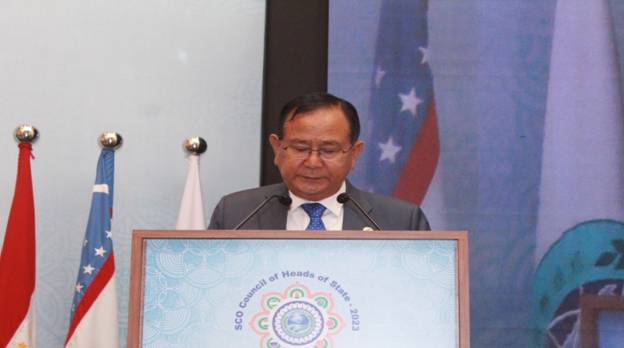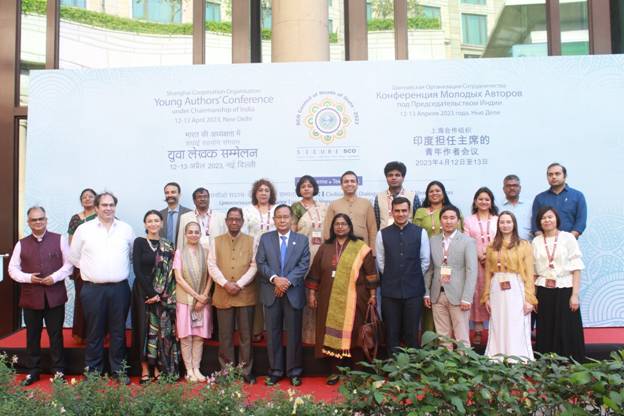The two-day Shanghai Corporation Organization (SCO) Young Authors’ Conference on" Civilizational Dialogue Among SCO Member States” with delegates from SCO Member Nations concluded on 13 April 2023.
Minister of State for External Affairs & Education, Shri Rajkumar Ranjan Singh presided as the Chief Guest at the Valedictory Ceremony of the SCO Young Authors’ Conference today. The Conference was organised by the Ministry of Education on 12-13 April 2023 at the Leela Palace, New Delhi with National Book Trust, India as the Implementing Agency.
Shri Rajkumar Ranjan Singh said that India has been actively taking part in all the cooperation activities of the organisation and is a highly valued member of the organisation. The focus on shared civilizational linkages at the SCO Young Authors’ Conference is the true reflection of the people of the region and the conference was a testimony of our commitment to contribute to the success of the organisation.

Prof. Govind Prasad Sharma, Chaiman, NBT in his address said that Dialogue is the basic medium to keep any human society and civilization alive. The conference brought forth the connection youth have not only with their own society but also with neighboring countries, as well as the vision that they have to further deepen inter-cultural cooperation.
Shri Yuvraj Malik, Director, NBT while delivering the vote of thanks said that conference was an enriching experience witnessing the exchange of perspective and ideas. The dialogue shed light on the interdependence between human beings and society and explored language as a social tool that facilitates interaction between various communities promoting the advancement of knowledge.
The SCO Youth Conference was centered on the theme “Civilizational Dialogue Among SCO Member States” with six sessions focussing on History & Philosophy, Economy, Religion, Culture, Literature and Science & Medicine, respectively. The first session on History and Philosophy focussing on ‘Shared Civilizational Links and its impact on Modern Ethical Behaviour’ was chaired by Dr. Yuthika Mishra with Ms. Ekatherina S. Manoylo from the Russian Federation and Dr. Ayesha Gautam from India as the panelists. The session was moderated by Prof. Ajoy Karnati. The speakers delved into the commonalities that exist between the SCO nations, the need for dialogue and cooperation by looking back at historical exchanges that facilitate understanding, the relation between morality and traditions and the conditions that gave rise to thought systems which travelled between the countries. The discussants, Dr. Aarshi Dua, Dr. Ruchi Verma and Mr. Fahad Nahvi enriched the session with their detailed comments and questions.
The second session was on the sub-theme Economy, focusing on ‘Trade and Commerce Linkages’. Dr. Sunil Ashra was the Chair for the session with Ms. Anastacia V. Volodina from the Russian Federation and Dr. Pravesh Kumar Gupta from India as the speakers. The session was moderated by Mr. Kumar Vikram. The speakers delved into the connection between the film and the book industry in a fresh take on the different sides of the economy, the history of trade between India and Central Asian countries and how trade routes evolved over the ages. The discussants, Dr. Ritika Joshi and Dr. Tasha Agarwal contributed to the discussion with their insightful observations.

The third session dealt with the topic of Religion with emphasis on ‘Movement of Religious Ideas and Thoughts in the SCO Regions’. The session was chaired by Mr. Chamu Krishna Shastri and moderated by Ms. Deepa Singh. The panelists for the session were Ms. Nurlan Kyzy Begaiym from the Kyrgyz Republic, Dr. Pranshu Samdarshi from India and Ms. Ainur Akhmetova from Kazakhstan. The panelists spoke about the existence of multi-religious, syncretic societies in their countries, the centrality of spirituality, the ancient inter linkages between the SCO countries and the need to use this cooperative spirit to expand the concept of dialogue. The discussants, Dr. Aarshi Dua and Dr. Ritika Joshi continued the discussion with their perspectives on the role of storytelling and social media in the propagation of religious ideas.
Session four revolved around Culture, with an emphasis on 'Civilizational Roots of Contemporary Cultures'. Dr. J.K. Bajaj was the Chairperson for the session and Ms. Neera Jain was the Moderator. Dr. Rashmini Koparkar from India, Mr. Erkanat Khuatbekuly from Kazakhstan and Ms. Anastacia V. Volodina were the speakers. The panel spoke about how in this era of rapid development, culture helps us preserve our identity and heritage. India and the Central Asian countries have been witness to exchange of ideas, commerce and language since time immemorial which has enabled the emergence of a shared cultural heritage. The discussants, Ms. Ivy Handique and Mr. Mayank Singh Singh took forward the dialogue with their comprehensive commentary.
The fifth session of the Conference took place on the sub-theme of Literature with focus on 'Translation and Interpretation of Literary Texts'. The session was chaired by Prof. Badri Narayan and was moderated by Mr. Kumar Vikram. The panelists for the session were Ms. Ekatherina S. Manoylo from the Russian Federation, Ms. Tanvi Negi from India, Ms. Ainur Akhmetova from Kazakhstan and Dr. Sonu Saini from India. The speakers delved into the rich corpus of literature that exist in all SCO nations, translation as a mediation between cultures and languages and the complexities behind it. The discussants for the session, Ms. Anagha Gopal and Mr. Sumant Salunke facilitated the discussion with comments and insightful questions.
The last session of the two-day SCO Young Authors’ Conference was on the theme Science & Medicine, with special focus on ‘Perspectives on Science and Medicinal Knowledge Systems of SCO Member States’. The esteemed panellist of the session included Dr Aditya Kolachana from India and Ms Nurlan Kyzy Begaiym from Kazakhstan. Mr Maxim A. Zamshev from the Russian Federation was the Chairperson and Ms Neerja Anand was the moderator of the same. The panel highlighted the role of medicine in the 21st century and the need to strike a balance between traditional and modern medicinal practices. India has been successful in making traditional practices of medicine like Ayurveda, licensed practice of science. It was also highlighted that these traditional medicinal knowledge systems are evidenced in both Kyrgyz and India’s epics. The session was taken forward by discussant, Ms Damini Roy, who initiated a question and answer round with her perceptive points.
The Conference provided fresh perspectives from the participating delegates, scholars and speakers exploring the mutual and distinct characteristics in our cultures and heritage at the same time acknowledging the role of literature in aiding the connection between cultures.
*****


